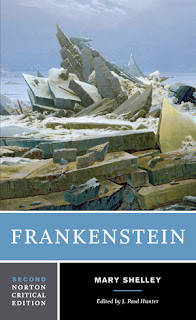Norton Critical Editions
Mary Shelley (Author), J. Paul Hunter (Editor, University of Chicago)
http://books.wwnorton.com/books/webad.aspx?id=21895
Paperback
Book Details
Retail: $17.50
December 2011
ISBN: 978-0-393-92793-1
544 pages
Description:
The best-selling student edition on the market, now available in a Second Edition.
Almost two centuries after its publication, Frankenstein remains an indisputably classic text and Mary Shelley’s finest work.
This extensively revised Norton Critical Edition includes new texts and illustrative materials that convey the enduring global conversation about Frankenstein and its author. The text is that of the 1818 first edition, published in three volumes by Lackington, Hughes, Harding, Mavor, and Jones. It is accompanied by an expansive new preface, explanatory annotations, a map of Geneva and its environs, and seven illustrations, five of them new to the Second Edition.
Context is provided in three supporting sections: “Circumstance, Influence, Composition, Revision,” “Reception, Impact, Adaptation,” and “Sources, Influences, Analogues.” Among the Second Edition’s new inclusions are historical-cultural studies by Susan Tyler Hitchcock, William St. Clair, and Elizabeth Young; Chris Baldrick on the novel’s reception; and David Pirie on the novel’s many film adaptations. Related excerpts from the Bible and from John Milton’s Paradise Lost are now included, as is Charles Lamb’s poem “The Old Familiar Faces.”
“Criticism” collects sixteen major interpretations of Frankenstein, nine of them new to the Second Edition. The new contributors are Peter Brooks, Bette London, Garrett Stewart, James. A. W. Heffernan, Patrick Brantlinger, Jonathan Bate, Anne Mellor, Jane Goodall, and Christa Knellwolf.
A Chronology and Selected Bibliography are also included.
Contents
List of Illustrations
Introduction
The Text of Frankenstein
map: Geneva and Its Environs
Title page (1818)
Dedication (1818)
Preface
Frankenstein
Contexts
CIRCUMSTANCE, INFLUENCE, COMPOSITION, REVISION
- Mary Shelley • Introduction to Frankenstein, Third Edition (1831)
- John William Polidori • Letter Prefaced to The Vampyre (1819)
- M. K. Joseph • The Composition of Frankenstein
- Chris Baldick • [Assembling Frankenstein]
- Richard Holmes • [Mary Shelley and the Power of Contemporary Science]
- Christa Knellwolf and Jane Goodall • [The Significance of Place: Ingolstadt]
- Charles E. Robinson • Texts in Search of an Editor: Reflections on The Frankenstein Notebooks and on Editorial Authority
- Anne K. Mellor • Choosing a Text of Frankenstein to Teach
RECEPTION, IMPACT, ADAPTATION
- Percy Bysshe Shelley • On Frankenstein
- [John Croker] • From the Quarterly Review (January 1818)
- Sir Walter Scott • From Blackwood’s Edinburgh Magazine (March 1818)
- Edinburgh Magazine • [On Frankenstein] (March 1818)
- Gentleman’s Magazine • [On Frankenstein] (April 1818)
- Knight’s Quarterly • [On Frankenstein] (August–November 1824)
- Hugh Reginald Haweis • Introduction to the Routledge World Library Edition (1886)
- Chris Baldick • [The Reception of Frankenstein]
- William St. Clair • [Frankenstein’s Impact]
- Susan Tyler Hitchcock • [The Monster Lives On]
- Elizabeth Young • [Frankenstein as Historical Metaphor]
- David Pirie • Approaches to Frankenstein [in Film]
SOURCES, INFLUENCES, ANALOGUES
- The Book of Genesis • [Biblical Account of Creation]
- John Milton • From Paradise Lost
- Percy Bysshe Shelley • Mont Blanc (1816)
- [The Sea of Ice] (1817)
- Mutability
- George Gordon, Lord Byron • Prometheus
- Darkness
- From Childe Harold’s Pilgrimage, Canto III (1816)
- Charles Lamb • The Old Familiar Faces
Criticism
George Levine • Frankenstein and the Tradition of Realism
Ellen Moers • Female Gothic: The Monster’s Mother
Sandra M. Gilbert and Susan Gubar • Mary Shelley’s Monstrous Eve
Mary Poovey • “My Hideous Progeny”: The Lady and the Monster
Anne K. Mellor • Possessing Nature: The Female in Frankenstein
Peter Brooks • What Is a Monster? (According to Frankenstein)
Bette London • Mary Shelley, Frankenstein, and the Spectacle of Masculinity
Marilyn Butler • Frankenstein and Radical Science
Lawrence Lipking • Frankenstein, the True Story; or, Rousseau Judges Jean-Jacques
Garrett Stewart • In the Absence of Audience: Of Reading and Dread in Mary Shelley
James A. W. Heffernan • Looking at the Monster: Frankenstein and Film
Patrick Brantlinger • The Reading Monster
Jonathan Bate • [Frankenstein and the State of Nature]
Anne K. Mellor • Frankenstein, Racial Science, and the Yellow Peril
Jane Goodall • Electrical Romanticism
Christa Knellwolf • Geographic Boundaries and Inner Space: Frankenstein, Scientific Exploration, and the Quest for the Absolute
Mary Shelley: A Chronology
Selected Bibliography

No comments:
Post a Comment